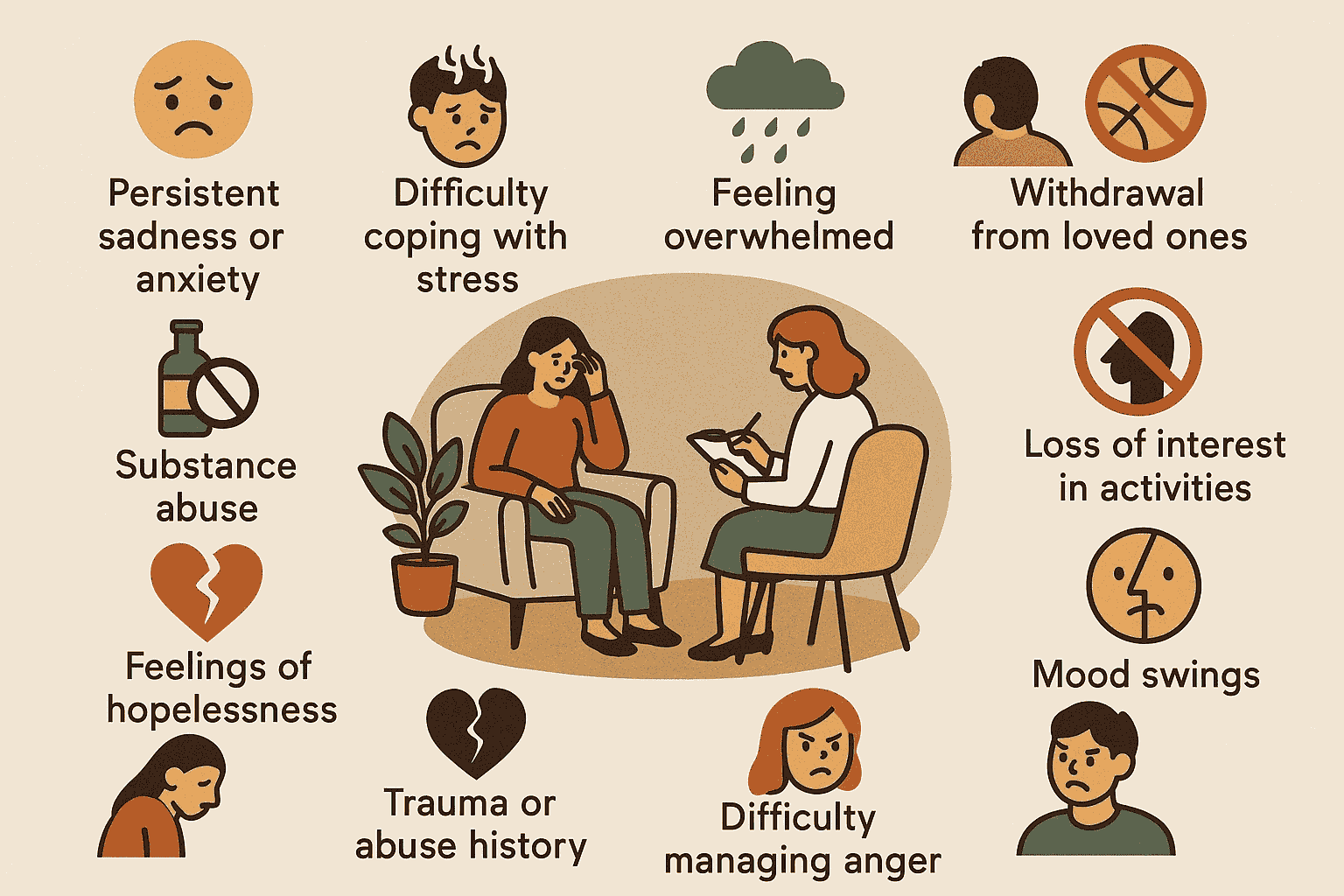Just How Mental Therapy for Teenage Individuals Can Foster Emotional Durability
Mental treatment for young adults works as a crucial resource in dealing with the unique emotional obstacles they face. It develops a safe room for them to explore their sensations and ideas. Via different restorative strategies, adolescents can develop crucial coping strategies. This process not just aids in taking care of stress and anxiety but additionally improves their interaction abilities. As they navigate these formative years, the inquiry stays: just how can these abilities form their future communications and wellness?
Recognizing the One-of-a-kind Challenges Facing Teens
Adolescence is usually celebrated as a time of growth and discovery, it is also marked by a myriad of special challenges that can considerably influence mental wellness. Teenagers browse a complex landscape characterized by hormonal changes, peer stress, and the mission for identification. The pressure to succeed academically and socially usually leads to heightened stress and anxiety and anxiety. Furthermore, the fast evolution of modern technology has presented issues such as cyberbullying and social media comparisons, aggravating feelings of inadequacy and seclusion.
Additionally, household dynamics can shift significantly throughout this period, with problems developing as teens look for freedom. Numerous likewise grapple with societal expectations that can really feel overwhelming. These combined factors produce a complicated psychological atmosphere, making it important to recognize and address the details obstacles teenagers face. Understanding these battles is crucial for promoting encouraging ambiences that advertise emotional strength and healthy growth throughout this critical life stage.
The Function of Psychological Therapy in Resolving Psychological Battles
Mental therapy plays a necessary duty in assisting young adults navigate their emotional battles, as it supplies a safe space for them to share their ideas and feelings. Many teenagers encounter obstacles such as anxiety, depression, and peer pressure, which can lead to overwhelming feelings. With therapy, they can verbalize these sensations and begin to recognize their roots.
Therapists help with seminars, allowing teenagers to discover their psychological landscape without judgment. This procedure promotes self-awareness, allowing them to recognize patterns in their habits and ideas. Individual Therapy Toronto. In addition, mental treatment can aid teens develop understanding into their psychological actions, advertising healthier coping systems
As they obtain a much better understanding of their feelings, young adults frequently find it easier to take care of stress and navigate interpersonal relationships. Generally, mental treatment offers as an important intervention, equipping young adults to address their psychological battles and construct a foundation for durability.
Structure Coping Approaches Through Therapeutic Practices
Restorative methods equip teens with efficient coping approaches to manage their emotional challenges. Via different methods, such as cognitive behavior therapy and mindfulness methods, teens learn to determine triggers and create personalized responses. These practices motivate self-awareness, permitting individuals to identify unfavorable thought patterns and change them with positive options. Additionally, therapy usually entails role-playing and situation analysis, which give practical structures for handling real-life situations.
Group treatment sessions can even more boost finding out by cultivating peer support and shared experiences, enhancing that face similar struggles. As young adults execute these techniques, they develop strength, allowing them to browse stress factors more successfully. This positive method to psychological health not just help in prompt coping yet additionally prepares for long-lasting emotional stability. Ultimately, outfitting young adults with coping methods via restorative techniques cultivates a feeling of company and empowerment in handling their mental wellness.
Enhancing Communication Skills and Self-Expression
Effective communication and self-expression are vital parts of emotional well-being for young adults. Mental treatment gives a supportive atmosphere where adolescents can discover and practice these skills. Through therapeutic strategies, teens are urged to verbalize their sensations and thoughts, fostering a deeper understanding of their emotions. This process advertises active listening, enabling them to engage better with others, therefore improving social connections.

Long-Term Advantages of Emotional Resilience in Adolescence
While traversing the obstacles of teenage years, the development of emotional strength can generate considerable long-lasting benefits for young adults. Resistant people are much better furnished to manage tension, which can result in improved psychological health and wellness outcomes in adulthood. They typically experience lower prices of stress and anxiety and anxiety, fostering an extra positive outlook on life.
Additionally, psychological durability enhances social connections, as these individuals often tend to interact a lot more successfully and deal with conflicts with higher ease. This capacity adds to more powerful social media networks and support systems, which are important throughout challenging times.
Durable teenagers are extra likely to accept obstacles as chances for development, leading to increased expert and scholastic success. Ultimately, the growing of emotional strength during teenage years lays a foundation for lifelong coping methods, empowering individuals to browse future hardships with self-confidence and adaptability.
Often Asked Concerns
Exactly how Do I Know if My Young Adult Needs Therapy?
Indications a teen might require therapy include relentless sadness, withdrawal from close friends or activities, radical adjustments in actions, declining scholastic efficiency, and trouble taking care of emotions. Observing these signs can motivate consideration for professional support.

What Types of Treatment Are The Majority Of Reliable for Teenagers?
Cognitive Behavior Modification (CBT), Dialectical Actions Treatment (DBT), and art or play treatment are among the most effective methods for young adults, helping them develop coping skills, enhance emotional guideline, and reveal themselves in positive ways.
How Can Parents Support Their Teen During Therapy?
Parents can support their teenager throughout therapy by actively listening, validating their feelings, keeping open interaction, encouraging involvement in sessions, and promoting a safe environment where the teen really feels comfy reviewing their emotions and thoughts.
Are There Any Type Of Risks Connected With Teenage Therapy?
Yes, threats related to teen therapy include prospective psychological discomfort, miscommunication between specialist and teenager, reliance on therapy, or exposure to unacceptable subjects. In addition, not all specialists may have the required experience with teenage concerns.
How Much Time Does Therapy Typically Last for Young Adults?
Treatment period for teens generally varies from a couple of weeks to several months, depending on specific needs, objectives, and the specific concerns being attended to. Individual Counselling Services. Procedure typically occur weekly, advertising gradual progression and psychological development
Psychological therapy for young adults serves as a critical resource in addressing the special emotional challenges they encounter. Mental treatment plays an important duty in helping young adults navigate their psychological battles, as it supplies a safe Individual Therapy Toronto room for them to share their feelings and ideas. Indications a teenager may require therapy consist of persistent unhappiness, withdrawal from tasks or friends, extreme adjustments in habits, decreasing academic performance, and problem taking care of emotions. Yes, risks connected with adolescent treatment include possible emotional discomfort, miscommunication between specialist and teenager, dependence on therapy, or exposure to improper subjects. Therapy duration for teens normally varies from a couple of weeks to several months, depending on individual requirements, goals, and the details issues being dealt with.